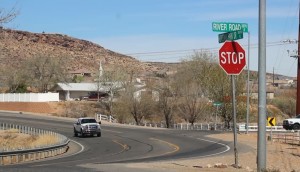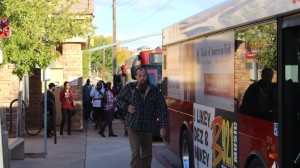ST. GEORGE – A looming question for voters is whether they would vote to approve a 0.25 percent general sales tax within the county to go toward area road projects and public transit. To date, a number of city councils have passed resolutions asking the Washington County Commission to give county residents that choice by putting the general sales tax initiative on the November ballot.

As of last week, Washington County Commissioner Victor Iverson said, the commission had received resolutions from St. George, Toquerville, Hurricane and Santa Clara. Other cities, such as Washington City, are strongly considering passing their own nonbinding resolutions for the commission.
“The cities really are asking the County Commission to put (the initiative) on the ballot,” Iverson said.
The 0.25 percent general sales tax would provide additional funding to individual cities for transportation needs and is equivalent to 1 cent for every $4 spent in the county.
Revenue gained from the sales tax would go toward projects like walking and biking trails, road improvements and public transit service expansion.
Largely known as the “local option sales tax,” the option was a part of the gas tax bill passed by the Legislature in 2015. That legislation raised the tax an additional 5 cents per gallon of gas at the beginning of the year.
Last year, the county received resolutions from the various cities urging the commission to put the sales tax initiative on the ballot. The commission chose not to do so however.
Iverson said it wasn’t a countywide election last year, so putting the initiative on the ballot would have been pricey – around $80,000 or more. As well, he said the commission had heard from county residents who were against the initiative.
An accompanying poll Iverson referenced showed the ballot initiative likely being defeated at the time.
Still, city officials, such as St. George Mayor Jon Pike, want the general sales tax initiative on the ballot so people can vote one way one another.

“The City of St. George would like to have (this) placed on the ballot this November,” Pike said.
The St. George City Council passed a resolution related to the initiative earlier this month. Though some of the council members did not like the idea of a new tax, they all agreed residents should have the opportunity to make the call.
“We’re saying the voters should have a chance to vote,” Pike said.
With it being a heavy election year, it’s anticipated more people will get out and vote this year versus last year, Pike said.
If the 0.25 percent general sales tax is put on the ballot and approved by voters, funds from the tax will be allocated in the following manner:
- Areas without public transit service: Cities, towns and unincorporated parts of the county will receive 0.10 percent of the funds; the remaining 0.15 percent will go to the county proper
- Areas with public transit service: St. George and Ivins will receive 0.10 percent for public transit use, 0.10 percent will go to the county’s cities, towns and unincorporated areas, and the county will receive 0.05 percent

St. George operates the SunTran bus service. Therefore, it would be entitled to the 0.10 percent transit allocation as would Ivins, although Ivins only has one route. The buses are operated and maintained by St. George and the service is extended to Ivins through an interlocal agreement.
The Washington City Council has yet to vote on a resolution related to the sales tax, though may likely do so in the near future.
During a recent Washington City Council meeting, council members discussed how funds could be used if approved, including potential application toward SunTran. The city has been working for the last few years to get the bus service expanded into the city.
“It may be the way for the city to fund its part of SunTran,” Washington City Mayor Ken Neilson said.
Overall, he said, Washington City has a fairly aggressive road maintenance program that tends to the city’s roads on a regular basis. However, as the city grows, so does the demand for maintenance and the funds that help it along.

“As growth goes, your funds get stretched, and this is a way for us to add some additional funds to those stretched funds,” Neilson said.
Many cities do appear to favor the idea of the general sales tax, Iverson said, though he added he is among the crowd that doesn’t like the idea of new taxes.
“Any time we start asking the citizens for additional revenue, additional taxes, you’re going to find me very reluctant to jump into that,” Iverson said.
Both Pike and Iverson said the voters needs to be educated on exactly what the transportation needs of their communities are and what providing additional funding for them could do.
If put on the ballot today, Iverson said he doesn’t believe the measure would pass. Still, it is not the commission’s role to pass a general sales tax, but rather it is their role to put it on the November ballot and let the voters decide.
Beyond asking the cities to send in resolutions concerning the ballot initiative, the Washington County Commission has not moved on the measure.
According to data from the Utah League of Cities and Towns, which supports the local option sales tax, if passed in Washington County, St. George could see an additional $1.4 million revenue toward its transportation funds and another $1.6 million applied toward SunTran. Washington City could receive around $316,000 in additional funding.
St. George News reporter Julie Applegate contributed to this story.
Email: [email protected]
Twitter: @MoriKessler
Copyright St. George News, SaintGeorgeUtah.com LLC, 2016, all rights reserved.
Increase the cost of the bus ticket. Pass the cost on to the actual bus riders since they are the ones who are after increased services.
And pass the cost on to people like so called Common Sense that drive on the city streets and utilize city property
Perhaps local government can stop spending on ‘nice to do’ and simply stick to the basics and there will be no need to raise taxes. The ‘nice to do’ items must be user funded or find non taxpayer funds. Less government not more. I guess the state legislators should NOT have diverted any of the gas tax increase for other than transportation needs.
Remember taxpayers, if you give them more money, they WILL spend it.
Duhhhhhhh